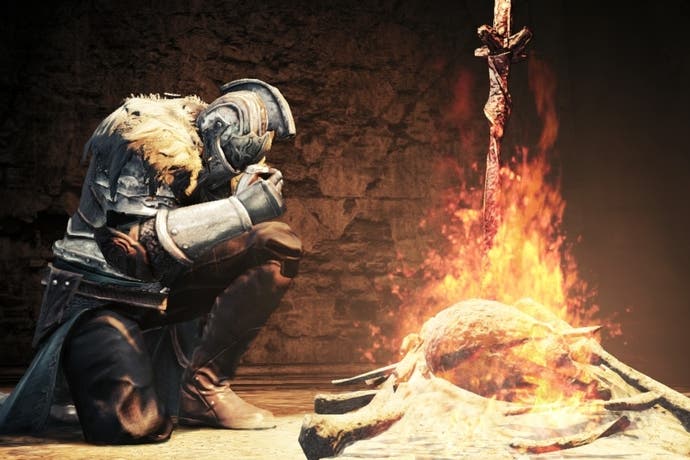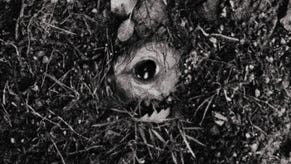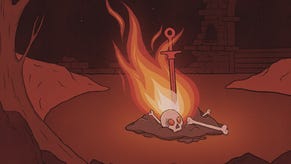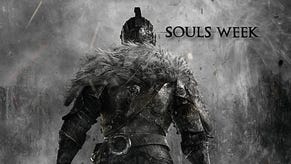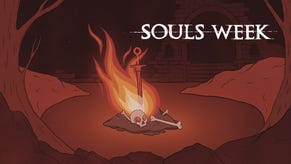Is Dark Souls 2 going soft?
A few hours with From Software's beta shows that, despite some additions and subtractions, the savage heart remains.
I couldn't kill the shopkeeper. I tried everything, from quick knives to slow broadswords, from dull clubs to a bright, ethereal shower of lightning bolts fired from a splayed palm but, regardless of the weapon of choice, she merely laughed her witchy laugh and asked me once again if there was anything in particular I was after. It's this sort of observation that marks video game players out to non-video game players as closet psychopaths and weirdoes. But you can tell an awful lot about a video game from the characters you are forbidden to kill.
Many games - especially those with a story to tell that relies on the key characters staying alive - wrest control from your hands whenever you turn your gun or spear on one such crucial lead. 'Ah', we think, as the unseen designer sheathes our weapon for us with a disapproving shake of the head: 'you're that kind of game'.
But Dark Souls was never that kind of game. On its forsaken mounds and in its bleak tunnels there were few friends to be found. Nevertheless, once found and once made, nobody would stop you from bludgeoning them to death, by will or by accident. No designer would stage an intervention and stay your hand. The only consequence to your action would be that you lost a friend. And if the friend you lost happened to be the only shopkeeper for miles, well, you better hope you weren't shopping for boots; you're in for a long walk.
As such, the fact that Merchant Hag Melentia, the first shopkeeper encountered in the beta test for Dark Souls 2 (playable for a lucky few during a short two-hour window on a suitably bleak and rainy Saturday evening this October) appears to be invulnerable is important. It could mean a variety of things. Perhaps she is the only shopkeeper in all the kingdom of Drangleic (the mountainous region, lined with coniferous trees and blanketed under a sky of purplish watercolours, in which the game appears to be set, and which appears to be Dartmoor's spiritual twin), with this fortunate ability by design. Or maybe From Software, the Shinjuku-based developer hard at work finishing the game for its March 2014 release date, simply hasn't got around to giving her a death croak and attendant animation yet.
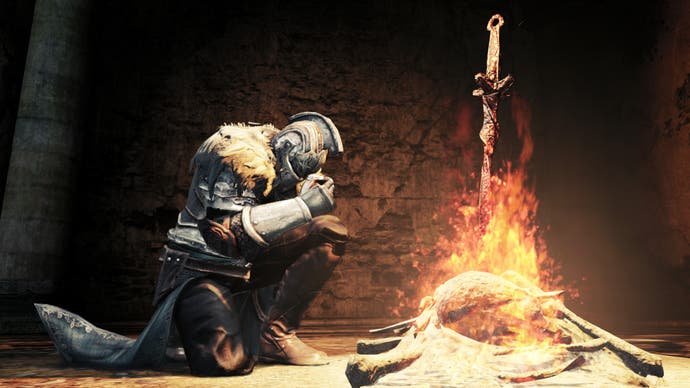
But the fear for the Dark Souls faithful, those who view the game's unflinching challenge and indifference to the player's choices (no matter how much those choices might interfere with the pre-defined story) as its essence, is that From Software is somehow dumbing down and protecting players from themselves. To someone like myself who accidentally killed a crucial blacksmith no fewer than 40 hours into Dark Souls and willingly restarted the game from scratch, the idea that the sequel is going soft is worrisome.
It's a fear exacerbated by the introduction of life gems, glowing pick-ups dropped at random by enemies that regenerate some of your character's health without the need to drink a draft from your precious Estus flask (the main non-magical ways in which to restore your character's life in the previous game). As the Estus Flask could only be refilled by resting at one of the game's intermittent bonfires, one of the few sanctuaries in the Dark Souls universe, life gems appear to be a generous concession to struggling players.
"The vast amount of work that has gone into smoothing over the online game and developing the subtleties of combat and control was clear. This is endlessly reassuring."
These fears, however, are unanimously dispelled when I round a treacherous corner to be met by a mob of glowing red phantoms, a group that descends, kicking and screeching en masse. This onslaught of overwhelming force appears just as capricious as in its predecessor. I die and, back at the bonfire - Dark Souls' respawn points which restore your health, replenish your spells but which also regenerate every enemy you've slain in the world - the sequel's next grim secret is revealed: your health gauge is increasingly capped as you die, lowering your maximum life with each subsequent death.
It's a tweak to the Dark Souls formula as clear and obvious as the new graphical engine, which purrs pleasingly as the long grass sways and the trees grip their leaves. Undead rise from their rotting slumps, hooded rogues skip and dart while dual wielding curved swords and fat-bellied executioners swing zinging scythes in the night air: not once does Dark Souls 2 miss a beat or skip a frame.
But on closer inspection, there are a great many smaller changes from the first game. Your lock-on, which fixes the camera on a specific foe, has been overhauled and, in a sense, weakened. No longer will your character automatically turn to face an opponent; instead you must manually manoeuvre yourself around, increasing the chance that you'll fail to block an incoming attack at the last moment.
Crucially, melee damage appears to be partially determined by your distance to a target, increasing as you close in, a development that adds further subtlety and nuance to what is already the finest system in video games. Your stamina, represented by a blue bar that depletes each time you swing a sword or deflect an attack, appears to drain more quickly than before and, if this strength runs out entirely, you're left open for an eternal second, entirely defenceless. Likewise, the window for backstabbing an opponent appears vastly reduced. These small amends will have tremendous knock-on effects, not least in player versus player matches, where flailing at rivals will be less advisable than ever before.
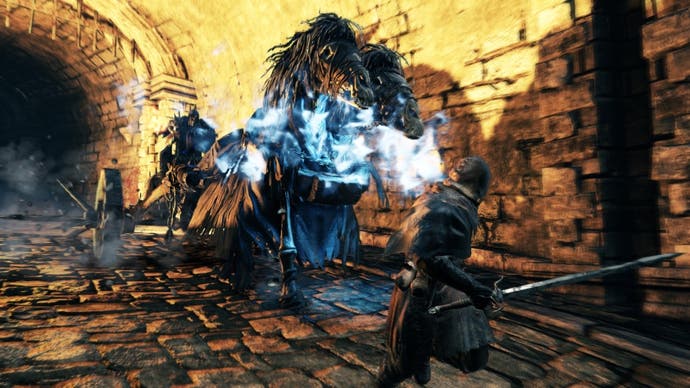
There are additions as well as subtractions. Heal spells will benefit any nearby teammates that you've attracted into your world to aid your progression. Dual-wielding (whereby a character can be equipped with a weapon in each hand) allows you to, for example, swing both swords at once, opening up entire new lists of moves. Archers - something of a novelty class in Dark Souls - can now notch an arrow and leave it drawn indefinitely while maintaining full mobility. When the bolt is finally loosed, it travels much more quickly than before. When levelling your character, souls (your accrued currency, used for buying items or, alternatively, levelling up) can be spent to increase strength, stamina and defence, but also specific types of magic. These changes will lead to a more diverse range of potential character builds, all of which will enliven and enrich the online portion of the game.
The Dark Souls 2 beta had few set-piece battles and only a handful of attention-pricking revelations, but that's no great surprise for a game that aims to keep tight hold of its secrets for some months yet. But the vast amount of work that has gone into smoothing over the online game and developing the subtleties of combat and control was clear. This is endlessly reassuring. From Software's approach has always been to focus on the foundations of play, ensuring that the basic effect of pressing a button is meaningful and specific. Then they build flamboyance and embellishment upon that core. For that reason this series has the best combat system of any video game. That is an accolade that, on this demo's evidence, appears yet further unassailable.
The short answer is no, it's still hard as nails. We've put together some essential Dark Souls 2 tips to get you through even the toughest boss fights.
